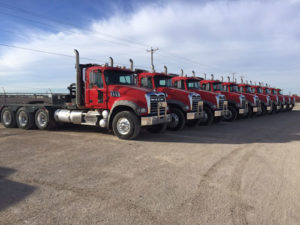“The last sale we had, I got up [on the podium] at 10:00 in the morning and got down at 7:30,” said Machinery Auctioneers Owner/Auctioneer Terry Dickenson. “I never left the chair.”
How does he keep from losing his voice after nine-and-a-half hours of constant auctioneering? “Well, the voice, you know—you just get on adrenaline” and that keeps him going without stopping for anything.
With headquarters in Alice, Texas, and auction yards in Carthage, Gainesville, San Antonio, and their largest yard—in size and in sales—in Odessa, Machinery Auctioneers has the Lone Star State covered—and its customers and clientele go beyond the state’s perimeter. Far beyond it.
As the name implies, the company sells large, mostly mobile, machinery—vacuum trucks, hot oilers, kill trucks, pickups, and more—with much of it, but not all, related to the oil and gas industry.
It would seem that the selection of items up for auction would be a bit of a snapshot of what’s happening in the industry at any given time. So, what’s being auctioned now?
“What we see, is everybody is selling stuff that’s less desirable because they’ve run it pretty hard,” he said, admitting, “It’s really not doing me [any] good if people read this, but that’s true.”
On the truth issue, he opines, “I tell everybody there’s only two people in this world that’s [dealing with] reality, it’s me and Donald Trump.”
Sometimes that honesty comes back to pay off nicely.
“A guy I had with trucks in Kenedy [Texas], he wanted to sell. Well, I went and looked at ’em and I said, ‘Why are you selling these?’ He said, ‘Well, we just thought we’d get new ones.’
“I knew the guy, and I said, ‘You don’t need the money?’ and he said, ‘No.’ I said, ‘Well, I’d run these trucks about two more years, because in two more years they’re going to bring the same thing, and you’ll have two more years of running out of ’em.’”
“He looked at me like I was crazy and said, ‘I can’t believe you turned down business.’ I said, ‘You want the truth, right?’”
Two years later the man called Dickenson back with the news that he was selling not only the trucks, but he wanted to auction everything he had—he’d decided to retire and close the business.
“He never would’ve done that if I hadn’t’ve been honest with him,” said Dickenson.
When asked if he recalled the most unusual thing he’d ever auctioned, he replied, “Some of this stuff, I don’t even know what it is.
“I’ve got a deal on my yard now that’s an environmental deal that separates oil, water, and mud. The guy [seller] spent $850,000 to build this. He used it about a year,” and the company using it was shut down.
“They paid $8,000 to move it to my yard,” and there was no interest in the machine when he tried to auction it off. So Dickenson bought it himself for $5,000 to sell as scrap—a deal in which he expects to come out ahead.
When asked if he thought he might find a water treatment company that needed something like that, Dickenson noted that the company is too busy with auctions to seek out individual buyers. “I tell everybody, ‘We’re not a sniper, we’re a gunslinger—we just get out in the middle of the street and start shootin’.”
On the topic of current auctions, he noted, “The thing that we see is right now, everybody’s not wanting to get rid of [anything] especially if they’ve got it paid for. They don’t want to go into debt, which is very smart, if you ask me.”
Who are the buyers of what is being auctioned? “We get a lot of mom and pops where the daddy’s got a truck, the son’s got a truck, the nephew’s got a truck, the cousin’s got a truck and they work under one MSA. They’ll take it and they can keep it running, where a big corporation can’t.”
Internet purchasing of all products continues to rise, and auctions are no exception. Dickenson says about 40 percent of his sales are online. Of the $4.9 million sold so far in 2019, $2.0 million has been online. Online buyers, he says, do have to make their own arrangements to pick up their purchases.
But the good news is that buyers can pick up their stuff at any hour. “My brother is more country than I am. He runs that yard out there, and he’ll meet ’em at two in the morning, if that’s what it takes,” said Dickenson.
 They have sold items in multiple states and foreign countries since the company’s founding in 2013.
They have sold items in multiple states and foreign countries since the company’s founding in 2013.
Items sold include “vacuum trailers, sand trailers, and anything you can hook to ’em. We sell construction machinery and we sell oilfield,” he said, estimating that the company had sold 800 vacuum trucks in the first half 2019, along with more than 1,800 licensed vehicles among other things.
He employs a simple strategy to keep auction prices up—don’t sell a whole big lot of one item at one event.
For example, “If a guy’s got 50 trucks of one type, I’m going to say, ‘Hey, let’s sell 20 of them now, 20 of them later, then 10, all in about 90 days.’”
Otherwise, “It’s just like going into WalMart, and you see M&Ms two for a dollar, that’s because M&Ms had too big a supply,” so they had to be sold cheap. Spreading out a truck sale avoids the appearance that they have to be sold cheap because there are so many of them.
On the other hand, in boom times he might sell all 50 at once—it depends on what he thinks the market will bear.
Whatever the exact price of oil, Dickenson finds some measure of success. “You could say about our business, we’re somewhat recession-proof. When things are bad, our business is better,” because firms that are downsizing auction off more equipment.
On the other end of the scale is Ritchie Brothers Auctioneers, whose fold also includes Kruse Energy Auctions and IronPlanet. Ritchie Brothers sells full scale worldwide.
For our Q&A with Ritchie Brothers Auctioneers, see the accompanying article, “What Sells, and Why: An Auction Primer.”
Paul Wiseman is a freelance writer in Midland.










